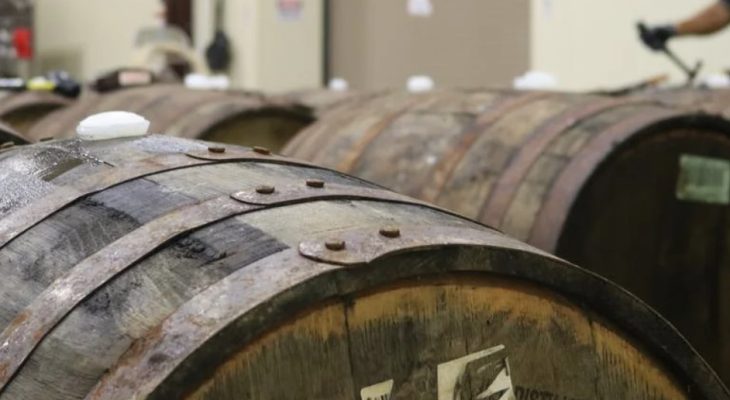This Is How Long Homebrew Lasts in a Pressure Barrel

Homebrewing is a long journey and it doesn’t end with fermentation. You also must find the best way to store your beer to ensure its longevity. If you’re wondering how long your homebrew will last in a barrel, here’s the answer.
Homebrew can last in a pressure barrel for up to a year. It is important, however, to ensure it’s stored in proper conditions. Keep your barrels away from direct sunlight in a cool place at about 53.6°F (12°C).
In this article, I will explain what conditions are best for storing your beer in a pressure barrel and how long you can expect it to last.
Storing Homebrew in a Pressure Barrel
As mentioned, beer can last up to a year in a pressure barrel. Of course, if you find that your homebrew tastes best when fresh, there’s no need to wait that long.
However, a significant number of beer styles can benefit from aging, as their flavor will continue to develop and grow more complex and pronounced. That is why many brewers like to store their homebrew over extended periods before opening.
Still, you can only expect your beer to last for up to a year in a pressure barrel if the necessary conditions are maintained. There are a number of external factors that can make your homebrew go bad much earlier.
To prevent that from happening, follow these simple tips for storing your beer, and you can be sure to enjoy it up to a year after it was brewed.
Protect From Direct Sunlight
The first thing to keep in mind is that sunlight can ruin your beer. UV rays start chemical reactions that quickly turn the complex flavors and pleasant aromas you worked so hard for into what people usually call ‘skunky beer.’
The reason for such a weird name is that it smells very much like skunk spray, and there is even a scientific explanation for that!
When you add hops to your homebrew, they release iso-alpha acids. These chemical compounds give your beer a pleasant bitterness and are usually great for the flavor.
However, when UV rays come in contact with iso-alpha acids, the latter start to degrade. They also interact with other molecules and start further reactions.
The process continues until, eventually, your beer is full of molecules almost identical to those in skunk spray.
That, of course, is no happy prospect. While a pressure barrel is not a glass bottle, prolonged contact with direct sunlight can still have terrible consequences and make your beer go bad sooner than expected.
To ensure your beer has a long shelf life, store it in a dark place where the sunlight won’t reach it. Some recommended options include:
- Cellars
- Sheds
- Garages
Store in a Cool Place
Temperature is also critical. Interestingly, possible issues resulting from improper temperature conditions have to do with exposure to oxygen.
You have probably heard a lot about how any contact with air should be limited and exposure to oxygen should be minimized when you homebrew. That is all true; however, some oxygen will inevitably get into your brew, starting the oxidation process.
During oxidation, oxygen interacts with other chemical compounds in your beer, breaking them down and creating other compounds that can affect the beer flavor. You can notice a variety of unpleasant undertones, from must to cardboard.
There is a way, however, to minimize the effects of oxidation and slow the process down significantly. First, motion can enhance it, so make sure not to disturb your barrels too much and store them in an upright position.
And second, yet most importantly, store your barrels at lower temperatures. About 53.6°F (12°C) is considered ideal.
However, remember that secondary fermentation doesn’t favor low temperatures. It is best to leave the barrels at room temperature for about a week after priming sugar is added to let fermentation successfully happen.
After that, move your barrels to a cooler place and make sure not to move them unless absolutely necessary.
Remember that any disturbance will also pump up the sediment from the bottom, so be especially careful a week or two before you intend to drink the beer.
Sterilize Thoroughly
When it comes to homebrewing, careful and thorough sanitation is a must. It applies to all your equipment, including pressure barrels or anything else you will use to store your beer.
Any neglect of proper sterilizing on your part can result in contamination, making your beer go bad quickly.
And while the alcohol will ensure none of the sneaky bacteria live, the flavor will be ruined for good.
There are a number of bacteria species that can make your beer go bad. For instance, some lactic acid bacteria, such as Lactobacillus brevis and Pediococcus damnosus, have adapted to the hop content.
While most of their fellow bacteria would not survive in beer, these have evolved to put up with the hops well enough to ruin your beer and bring a variety of off-flavors and aromas to it.
Acetic acid bacteria are vicious enough to survive alcohol content up to 10% v/v. They are able to oxidize ethanol to acetic acid, making your beer taste more like vinegar.
Pectinatus spp. can produce a variety of acids and other compounds, bringing a disturbing sour taste to your beer, along with an unforgettable rotten egg aroma.
So, you get the idea. While alcohol will eliminate most bacteria, and many of them won’t survive long enough to make your beer go bad, there are several overachievers able to ruin an entire barrel if they manage to get there.
The bottom line is that sanitation is key. Only use thoroughly sterilized barrels to store your beer and brew with sanitized equipment. That way, you can expect your homebrew to last up to a year and taste good when you open it.
Final Thoughts
Homebrew can last up to a year in a pressure barrel. Still, you must maintain proper conditions to ensure it lasts that long: store your beer in a cool place away from direct sunlight and only use well-sanitized equipment.



